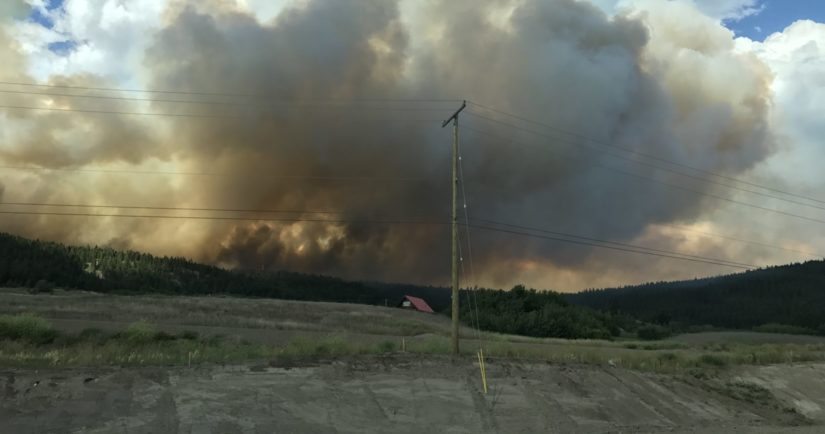The provincial government has issued a warning to British Columbians that current conditions across the province could lead to an earlier-than-normal wildfire season. Members of the public are being encouraged to increase their own household emergency preparedness.
Taking steps to include your pets in emergency planning is crucial to ensure your furry family members are also taken care of in the case of a wildfire evacuation.
To make your emergency exit as efficient as possible, we have included tips and a downloadable evacuation checklist below.

Prepare & Prep
Pack a “to go” bag: Having a ‘to go’ bag ready is essential. It should include everything from your pet’s photographs to their microchip information, medications and medical records.
Collar, tag and permanent ID: Keep a collar and tag on your pet with your home phone number and address. As pets can slip out of their collars, make an appointment with your vet to get your pet a permanent ID such as a microchip or tattoo.
Register your pet: In the event you’re separated from your pet during an emergency evacuation, make sure your pet and their identification are registered with the BC Pet Registry (microchip, tattoo or licence). This step is crucial for a quick and safe return.
When your pet is found, their microchip can be scanned or tattoo code read. The ID is then searched on bcpetregistry.ca and the owner is contacted using the phone number or email found on the pet’s profile. Remember to keep your contact details updated.
Important Emergency Checklist
- Food, water and treats for one week:
- Include dishes – collapsible are great,
- Manual can opener, spoon/scoop.
- Dogs: 70 mL/kg water per day
- Cats: 1 litre/day
- Pet first aid kit: Have the ability and knowledge to provide emergency help for your pet.
- Medications and medical records: include vet contact info and pet photos with written descriptions of your pets and store them in a Ziploc bag.
- Copy of your pet’s current vaccination history.
- Any special medications and instructions.
- Dogs: waste bags; disinfectant for pet mess clean-up, paper towels,
- Small cat litter box, litter, scoop, garbage bags,
- Small animals: bedding, extra water bottle, hiding box, extra hay.
- Dog leashes (6 foot and 15-20 foot), harness, muzzles; consider having a cat harness and leash
- Emergency Sticker: Put a sticker on each entry for first responders.
- Sturdy carriers: Consider an expandable “tent” carrier for cats, an exercise pen
for dogs or a travel cage for small animals.
If you can bring it, a larger expandable “tent” carrier for cats or an exercise pen for dogs can make them a bit more comfortable if you’re going to be out of your home for an extended period of time.
Having spaces for your cat or dog to hide in will provide some much-needed comfort. While humans understand what’s going on and know it’s temporary, a pet going into a big gym or a shelter is scary for pets. Having somewhere they can play or hide gives them a chance to feel safe wherever they are.
- Shade: without a carrier, having something to provide shade if outdoors.
- Toys to help entertain and lower stress (dogs: Kong, ball, treat ball; cats: feather wand, catnip toys)
- Comfort: Bring some of the things that will allow them to feel comfortable. This could be a toy or a brush from home, or their favourite treats help to keep them safe and happy.
- Extras: Towels/blankets, paper towels, rope, duct tape, Sharpie marker,
snap ties.
- Label all containers with pet names and your contact information – things can go missing in an emergency. As many items as possible should be packed in ready-to-go bins or backpacks. Mark storage bins with pet names and your contact information in case items are separated at an evacuation centre.
While in storage, rotate pet food and water every three months; replace medications as advised by your veterinarian.
- If you have animals who cannot be moved in an immediate evacuation, such as aquarium fish or farm animals, create a sign describing the animals left on the property with your name and contact information. Prepare this now and keep tape with it so it is ready to affix to your door to alert rescue officials.
Want to provide supplies? Contact each shelter directly if you have pet supplies to drop off or donate below:
